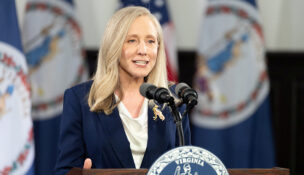Looking for election clues
Panelists discuss the fate of McAuliffe, Cuccinelli and Warner
Looking for election clues
Panelists discuss the fate of McAuliffe, Cuccinelli and Warner
Virginia Business looked at the results of the November election at its seventh annual Political Roundtable, held at The Jefferson Hotel in Richmond on Nov. 14. Virginia Business editors and members of an audience of more than 100 people posed questions to veteran panelists Whitt Clement, a partner in the government relations practice at Hunton & Williams who formerly was a state secretary of transportation and a member of the House of Delegates from the Danville area; Chelyen Davis, a political reporter at the Free Lance-Star in Fredericksburg; Ben Dendy, president of Richmond-based lobbying firm Vectre Corp. and a former senior staff member to two Virginia governors; Stephen Farnsworth, professor of political science and director of the Center on Leadership and Media Studies at the University of Mary Washington; and Jeff Schapiro, a political reporter and columnist for the Richmond Times-Dispatch. (Clement and Dendy were named to a bipartisan transition team for Gov.-elect Terry McAuliffe shortly before the event.)
Virginia Business: Gov.-elect McAuliffe has vowed to work with Republicans, but after such a bitter, divisive election, does he stand a chance of bipartisanship?

Davis: My impression of McAuliffe from the campaign was that partisanship was sort of a business when he was at the [Democratic National Committee]. I didn’t really get the sense that he took it personally in the way that maybe Ken Cuccinelli did in a lot of ways. I think he means it when he says he’s going to try to work bipartisanly. As Jeff points out, he’s going to have to [reach out to Republicans] to actually get anything done. If there’s resistance to that, I would imagine it comes more from the Republican side in the legislature.
Farnsworth: I think it’s important to realize that we’re really looking at a very different Republican caucus than the one that Mark Warner faced when he was able to go across party lines a dozen years ago. The reality is that the gerrymandering has created a series of safe seats where the only real concern is whether you’re going to be “primaried.” So if there are Republicans who are interested in cooperating with the governor, and I don’t think there are that many to start with, I think they face great pressures and great risks if they choose to do so.
The evidence going back to the days when you had moderate Republicans like Sen. [John] Chichester and others working a bipartisan arrangement in Richmond, that’s really not today’s legislature. And I think it’s important to realize that the “Washingtonization” of Virginia politics … is going to create great challenges for this governor.
Dendy: I think there are two areas that they could work together. One is ethics reform, and the other is education. If you look at their House Republican education package and what the governor-elect has said about education, they’re both in favor of SOL [Standards of Learning] reform. In talking with some of the Republican legislators in recent days, they’re very much aware that with a governor, just like with a president, if nothing happens, they get their fair share of the blame. If they can find areas that they can work together, I think they want to do so.
VB: How big an issue will ethics and political donations be in this legislature?
Farnsworth: I think that with respect to ethics, there’s great pressure to do something. But politicians often benefit from short attention spans in the mass public, and this is probably one of those cases where they will offer up some measure to show they’ve passed something with respect to ethics reform, but it would probably fall well short of what true reform might represent. This is a system that’s pretty lax, and there’s plenty of room to tighten it up where it could still remain relatively loose. I imagine we’ll be looking at something in that sort of middle range.
Clement: In the lobbying world, I think most lobbyists would feel that the law should be reformed … [If] they’re going to reform the system, they need to fix certain technical things in the law that make it difficult for lobbyists trying to comply with the law. For example, certain forms you file with the state Board of Elections, others you file with the secretary of the commonwealth. Some have a July 1 deadline; the others have a December deadline. … Those things need to be fixed, and I think they will.
A lot of people are concerned that there might be an overreaction. Unless the Democratic/Republican caucuses are able to work out a consensus bill before the session starts, … I wouldn’t be surprised if there are 50 bills [on ethics]. Everybody is going to want to have a bill in to say that they have made an effort to address the situation.
Schapiro: It is a self-policing system. I think despite all the talk about tightening the rules, that’s something I think the legislature is going to want to preserve. The idea of fully criminalizing certain forms of behavior and turning all of this over to commonwealth’s attorneys and prosecutors is sort of alarming to legislators. They want to be able to look after themselves. I suspect as long as they’re in a position to do so, the public will probably be disappointed with the steps that the legislature takes, if it takes any.
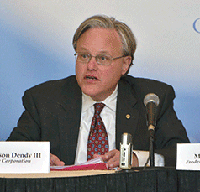
VB: How important do you think energy policy will be to the McAuliffe administration?
Clement: I know that there are businesses in Virginia that are concerned about the direction Terry McAuliffe will take as a new governor. There were a great deal of political contributions from the environment community, not just in Virginia … but well beyond Virginia’s borders.
Appalachian Power is very dependent upon coal. They have spent millions of dollars complying with the EPA. Say what you will about coal … but there are thousands of Virginians whose livelihood is dependent upon coal. The new governor, Terry McAuliffe, is going to have to be mindful of and be respectful of the importance of that industry, that energy generating source of coal in Southwest Virginia. He has come out in support of offshore wind energy, and that’s fine … [E]nergy is going to be a very important issue to this governor and governors in all the other states. It’s a big deal. So I think you’ll see a fair share of attention given to that.
Schapiro: There are two panelists [Dendy and Clement] who are associated with the effort to lift the prohibition on uranium mining. Gov.-elect McAuliffe has basically said not on his watch. I think you’ll have to ask Ben and Whitt exactly what Virginia Uranium will be doing going forward. There is that issue.
But on coal, I think it’s perhaps an oversimplification to attribute coal’s difficulties to an overaggressive, Democratic EPA in Washington. Coal has been in decline in Virginia for years. The best seams are tapped out. Employment has been in decline for years. There are more UMW [United Mine Workers] retirees in Virginia than there are active members. It is nonetheless an important symbolic industry for Virginia.
I would suggest that the issue of energy for Southwest Virginia perhaps is more about retooling, recalibrating the Southwest Virginia economy.
Dendy: Regarding coal … we do know that a major, major part of the energy across the United States comes from coal. And I think it’s going to be part of our energy solution for a long time.
Regarding uranium, I don’t think that deposit is going to go away … I have difficulty imagining how Virginia is going to be a [major leader in] energy if we don’t take advantage of that major energy source. Now I don’t know when it’s going to be, but I think it will happen at some point.
(Editor’s note: Virginia Uranium is not backing mining legislation in 2014.)
VB: McAuliffe wants to expand Medicaid in Virginia, but many Republicans are opposed. Do you think there’s any room for compromise here?
Schapiro: I wonder if Medicaid expansion is one of those issues [where], in a grand bargain, the resistance, which is most concentrated in the Republican Caucus, in the House of Delegates, could somehow be diluted if it were offered something it values. Maybe something on the order of a big tax cut …
Of course, the problem with that is when you make reductions in tax rates, or you start fiddling with credits, you’re usually going after a constituent …
But I think the tradeoff becomes more difficult because of what’s going on with the [Affordable Care Act] in Washington.
Dendy: But I do think we need to keep in mind that this is going to be a budget issue. This is not going to be a freestanding bill that has to pass the legislature. A majority of the Senate favors Medicaid expansion. The governor favors it pretty strongly. There are big problems with it on the House side. But with the budget negotiations, it may come down to who blinks last like it always does.
I think the other thing we have to keep in mind, when you talk to people in the legislature, many of them who are publicly opposed to [Medicaid expansion] recognize that it’s the right thing to do. Virginians are going to be paying billions of dollars in taxes for the Affordable Care Act. They will get back none of that money if we don’t expand Medicaid. If they do expand it, we’ll get back almost the full amount …
The Lee County hospital just recently shut its doors. Hospitals are really facing a difficult situation. When folks show up at their doors, they have to treat them. We’re 47th in the country in Medicaid reimbursements … I think that’s going to be an issue that might not be decided until April or May or some time prior to the end of the fiscal year.
Davis: The thing with Medicaid expansion is the legislature last year put it in the hands of this Medicaid Innovation and Reform Commission [MIRC]. It’s not like McAuliffe can just put out a bill or just put out a [budget] amendment and convince enough people to make it so. There are steps they have to go through.
I agree with Ben that there are economic arguments that can be made for Medicaid expansion that may sway some Republicans. I would also say there has been some discussion of things that are like expansion but aren’t called expansions. [State ] Sen. Walter Stosch had mentioned some things like that … I think what they would like to do is provide a way to cover more people without really calling it Medicaid expansion.
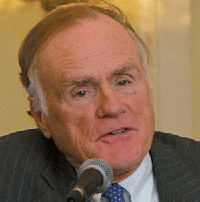
Farnsworth: I, too, agree that there is opportunity here. This may be one of the areas that we can point to where there may be an ability to work across party lines to come up with some kind of agreement in part because [the issue] really does mix up the traditional Democratic and Republican positions when you start talking about business preferences and so on.
I do think, though, it’s important to add to this conversation that it’s going to be really hard to decouple this from the success or failure of the Obama initiatives in Washington. I think if the Affordable Care Act continues to have the world of problems that it has with its online registration system, it’s going to be very hard to convince Republicans who are not tempted to give Obama the benefit of the doubt to go along with anything that’s connected to the Affordable Care Act … The truth is, if they don’t fix it in Washington, I can’t imagine a compromise in Richmond.
VB: I’d like for you all to comment on what you think is next for Ken Cuccinelli.
Schapiro: Ken Cuccinelli is into ideas. I somehow just don’t see him going off to a law firm and working on the clock. I see him going to some place that thinks about issues, maybe a think tank, and that this would be a place that would be an effective forum for him. I often wonder if perhaps he stood for the wrong office, that he would have been better off deferring to Bill Bolling for governor, and perhaps standing for the Senate in 2014 against Mark Warner. I don’t know that Sen. Warner, former Gov. Warner, wouldn’t be re-elected, but I have every confidence that Ken Cuccinelli would hold his feet to the fire.
Davis: I’ve certainly heard some rumors that some conservatives would like Cuccinelli to run against Warner. My money would be where Jeff’s is, some sort of conservative think tank. Maybe some sort of conservative talking circuit, making speeches. He remained [attorney general] because he needed the job, and I would imagine he’s going to need another one in pretty short order.
Farnsworth: I think we might consider Fox News as the next stop. I think Ken Cuccinelli as attorney general was very effective in putting forward a conservative message on Fox News. They called him often. He was the most quoted attorney general in the country. And there does seem to be an opportunity I think to engage fully in these issues of ideas that Jeff was talking about because I do think that we have not heard the last from Ken Cuccinelli. But it very well may be on the cable networks that we hear from him next.
(Editor’s note: Since this panel discussion, Cuccinelli has ruled out a Senate run in 2014.)
VB: Do any of you think that Warner is vulnerable in 2014?
Clement: I think the most vulnerable point is this Affordable Care Act and the rollout and giving Americans the opportunity to sign up for health insurance. That computer mess has got to be straightened out and straightened out as quickly as possible. [If not,] there is, I think, huge fallout. I believe there are 14 U.S. senators who are Democrats on the ballot in 2014. And, of course, Mark Warner is one.
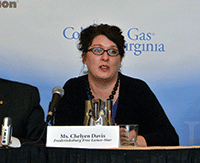
Dendy: Mark Warner, I think, has one of the strongest political organizations in the state. And he has stayed in contact with people in the areas of the state that lean Republican. I think it will be very difficult to defeat him. I think he’ll win handily.
Farnsworth: I think whenever we and other universities and political organizations have polled, we’ve found Mark Warner to be extraordinarily fortunate in these poll numbers. Double-digit gains. Advantages over virtually everybody we could even think would be willing to do this.
But I think it’s important to realize that the best opponents that Mark Warner might face would have to give something up to run in many cases. If a Republican member of the House, for example, or a state senator were to try to challenge him, you’re looking at a huge amount of time and a huge amount of money, and the prospects not being particularly good.
VB: What lessons can be learned from this election?
Clement: The Republicans did very well with the voters that one would expect them to do well with: married couples, married men, married women, the white population. But it’s obvious to all of us that follow the process that demographics in Virginia are changing. I think what this election means or confirms [what was seen in the presidential election. Despite a lower turnout], the Democrats still were able to pull this victory out. They were able to do so because of the changing demographics. …
I think the Republican Party and Republican leaders really need to think about how they can stick to their principles but in a more appealing way.
Farnsworth: The Democrats can win by standing in place. The changes that Whitt’s talking about in terms of demographics are working in the Democrats’ favor, and the Republican Party has not been effective at countering the Democratic message, particularly with Latino voters …
Because of the growing share of the Virginia electorate that comes north of the Rappahannock and in Hampton Roads and in the suburban communities around Richmond, and the extent to which that growth is more Democratic than it is Republican, there really is a fundamental challenge here for the Republicans. They will lose ground if they stay in place demographically as well as geographically. I think that’s the big challenge for the party: How do you have a more compelling message?
Farnsworth: To pick up on what Whitt was saying, I’ve been doing a study this last week comparing the county-by-county results for the Tim Kaine gubernatorial election eight years ago and this election. What we find is that the Democrats can win by standing in place. The changes that Whitt’s talking about in terms of demographics are working in the Democrats’ favor, and the Republican Party has not been effective at countering the Democratic message, particularly with Latino voters …
The truth is that, because of the growing share of the Virginia electorate that comes north of the Rappahannock and in Hampton Roads and in the suburban communities around Richmond, and the extent to which that growth is more Democratic than it is Republican, there really is a fundamental challenge here for the Republicans. They will lose ground if they stay in place demographically as well as geographically. And I think that’s the big challenge for the party: How do you have a more compelling message? And how do you read a Virginian who is not going to respond as well to the messages, say, of the George Allen governor’s race about traditional Virginia and traditional Virginia cultures? It’s changing way too rapidly, and the Republican Party has to figure out a way to deal with that.
Schapiro: And part of figuring out that way is taking control of the party apparatus. Just because the Republicans have the stuffing kicked out of them on Election Day doesn’t mean that the people who crafted this ticket are going to have considerably less influence. Very conservative people are still sitting as chairs. They are still active in caucuses and committee meetings back home. Until there is some change at that level, until the apparatus is in the hands of a more diverse group, if you will, the Republican problems will persist.
Audience question: Would we be having a different conversation if Bill Bolling had been the nominee?
Dendy: [Virginia Tech professor James] Robertson, who was the author of a book about Stonewall Jackson, made a speech, and someone stood up and asked the question, “Would we have won the [Civil War] if Jackson had not died?” He said, “Well, you can’t remove one fact from history and expect that everything else stays the same … If Jackson had not died, there would have been no Gettysburg. It would have been fought in New Hampshire.”…
If you go back to the ’50s, no Virginia attorney general or lieutenant governor has served two terms since that time and gone on to be elected governor. That says something about their political ability, their willingness to take a chance. On the face of it, you look at those [election] results you think, yes, he would have won. But you never would know because you don’t know what would have happened in that case.
I think the governor’s problems would have been tied more directly to him than Attorney General Cuccinelli. The attorney general made an effort to extricate himself somewhat, maybe unartfully. But I don’t think Lt. Gov. Bolling could have done that at all.
Davis: I don’t disagree. We all look at it, and we can say, “Well, Bolling was as conservative as Cuccinelli, but maybe packaged in a more appealing way for a lot of voters.” But as Ben says, this was a candidate who dropped out rather than take the fight to a convention when that changed. He’s a candidate who stood by when McDonnell wanted to run for governor four years ago. Was the willingness to fight really there? I’m not sure.
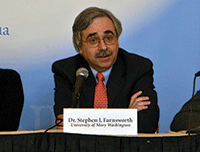
Bolling would have been a much tougher target to attack, because ultimately for the McAuliffe campaign to be successful, the election had to be about Cuccinelli. If the election was about McAuliffe, McAuliffe wouldn’t win. Would the McAuliffe campaign have been able to demonize Bolling to the extent they were able to demonize Cuccinelli? I tend to think not. But again, as we’ve been discussing, there are so many hypotheticals in this scenario, it’s really hard to say. I think the odds would have been much better had the Republicans nominated Bill Bolling.
Audience question: [Libertarian candidate Robert Sarvis won 6.5 percent of the vote in the governor’s race. Does this indicate that political conditions are becoming more favorable for third-party candidates?]
Clement: They’re very difficult with money being the driving force in elections … I think he’d have to be a great third-party candidate that people could really rally around. But the odds are really stacked against that person because of the way we do business in this country in electing candidates.
Farnsworth: I do think that the Libertarians will not be so fortunate as to consistently be able to run up against candidates like Ken Cuccinelli and Terry McAuliffe. This was an ideal environment for a Libertarian candidate but one not likely to be repeated.
In addition to the issue of money, there’s also the issue of political talent. Among some of my friends who are Republican consultants, there was no interest in working for Bolling as a potential independent candidate because that would really dry up their business with the Republicans. They’d never be able to work in this state again, or so they felt.
Schapiro: There was a point in Virginia’s political history, and fairly recently, in which the Independent alternative was very desirable and very much a reflection of where a lot of Virginians were. Harry Byrd quit the Democratic Party in 1970 and was elected as an independent to the Senate, not just barely, but with a very comfortable majority and re-elected in 1976 …
And of course, in the same era, Virginia elected an independent liberal lieutenant governor, Henry Howell, and in 1973, there was no Democratic nominee, and he again ran as an independent and narrowly lost the governor’s office.
But I think it has got to be somebody like that. Somebody that is coming out of another party, has a base, and is well known. It can’t be someone that no one has ever heard of.
T



